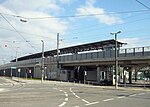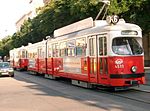Bohemian Prater
Amusement parks in AustriaBuildings and structures in ViennaTourist attractions in Vienna

The Bohemian Prater (German: Böhmischer Prater) is a small amusement park at the edge of Vienna. It dates to the second half of the 19th century, and some of the rides are more than 100 years old. The name is derived from the larger Wiener (Viennese) Prater. On 11 December 1944, during World War II, the Bohemian Prater was almost completely destroyed by a bomb attack. The centre of the Bohemian Prater forms the meeting centre Tivoli.
Excerpt from the Wikipedia article Bohemian Prater (License: CC BY-SA 3.0, Authors, Images).Bohemian Prater
Moselgasse, Vienna KG Oberlaa Stadt (Favoriten)
Geographical coordinates (GPS) Address Nearby Places Show on map
Geographical coordinates (GPS)
| Latitude | Longitude |
|---|---|
| N 48.165 ° | E 16.398 ° |
Address
Moselgasse
1100 Vienna, KG Oberlaa Stadt (Favoriten)
Austria
Open on Google Maps








